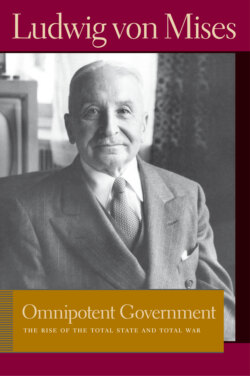Читать книгу Omnipotent Government - Людвиг фон Мизес - Страница 18
На сайте Литреса книга снята с продажи.
4. The Constitutional Conflict in Prussia
ОглавлениеThe Progressives, as the liberals in the Prussian lower chamber (chamber of deputies) called their party, bitterly opposed the reform. The chamber voted repeatedly against the bill and against the budget. The King—Frederick William IV had now died and William I had succeeded him—dissolved Parliament, but the electors returned a majority of Progressives. The King and his ministers could not break the opposition of the legislative body. But they clung to their plan and carried on without constitutional approval and parliamentary assent. They led the new army into two campaigns, and defeated Denmark in 1864 and Austria in 1866. Only then, after the annexation of the kingdom of Hanover, the possessions of the Elector of Hessen, the duchies of Nassau, Schleswig, and Holstein, and the Free City of Frankfurt, after the establishment of Prussian hegemony over all states of Northern Germany and the conclusion of military conventions with the states of Southern Germany by which these too surrendered to the Hohenzollern, did the Prussian Parliament give in. The Progressive party split, and some of its former members supported the government. Thus the King got a majority. The chamber voted indemnification for the unconstitutional conduct of affairs by the government and belatedly sanctioned all measures and expenditures which they had opposed for six years. The great Constitutional Conflict resulted in full success for the King and in a complete defeat for liberalism.
When a delegation of the chamber of deputies brought the King the Parliament’s accommodating answer to his royal speech at the opening of the new session, he haughtily declared that it was his duty to act as he had in the last years and that he would act the same way in the future too should similar conditions occur again. But in the course of the conflict he had more than once despaired. In 1862 he had lost all hope of defeating the resistance of the people and was ready to abdicate. General von Roon urged him to make a last attempt by appointing Bismarck prime minister. Bismarck rushed from Paris, where he represented Prussia at the court of Napoleon III. He found the King “worn out, depressed, and discouraged.” When Bismarck tried to explain his own view of the political situation, William interrupted him, saying: “I see exactly how all this will turn out. Right here, in this Opera square on which these windows look, they will behead first you and a little later me too.” It was hard work for Bismarck to infuse courage into the trembling Hohenzollern. But finally, Bismarck reports, “My words appealed to his military honor and he saw himself in the position of an officer who has the duty of defending his post unto death.”*
Still more frightened than the King were the Queen, the royal princes, and many generals. In England Queen Victoria spent sleepless nights thinking of the position of her eldest daughter married to the Prussian Crown Prince. The royal palace of Berlin was haunted by the ghosts of Louis XVI and Marie Antoinette.
All these fears, however, were unfounded. The Progressives did not venture a new revolution, and they would have been defeated if they had.
These much-abused German liberals of the 1860’s, these men of studious habits, these readers of philosophical treatises, these lovers of music and poetry, understood very well why the upheaval of 1848 had failed. They knew that they could not establish popular government within a nation where many millions were still caught in the bonds of superstition, boorishness, and illiteracy. The political problem was essentially a problem of education. The final success of liberalism and democracy was beyond doubt. The trend toward parliamentary rule was irresistible. But the victory of liberalism could be achieved only when those strata of the population from which the King drew his reliable soldiers should have become enlightened and thereby transformed into supporters of liberal ideas. Then the King would be forced to surrender, and the Parliament would obtain supremacy without bloodshed.
The liberals were resolved to spare the German people, whenever possible, the horrors of revolution and civil war. They were confident that in a not-too-distant future they themselves would get full control of Prussia. They had only to wait.
